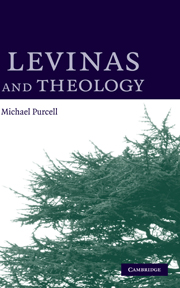Book contents
- Frontmatter
- Contents
- List of abbreviations of Levinas' works
- Introduction
- 1 Levinas, phenomenology, and theology
- 2 Ethics, theology, and the question of God
- 3 Incarnate existence
- 4 Existence as transcendence, or the call of the infinite: towards a theology of grace
- 5 The economy and language of grace: grace, desire, and the awakening of the subject
- 6 The liturgical orientation of the self
- 7 Eucharistic responsibility and working for justice
- Notes
- Select bibliography
- Index
4 - Existence as transcendence, or the call of the infinite: towards a theology of grace
Published online by Cambridge University Press: 08 January 2010
- Frontmatter
- Contents
- List of abbreviations of Levinas' works
- Introduction
- 1 Levinas, phenomenology, and theology
- 2 Ethics, theology, and the question of God
- 3 Incarnate existence
- 4 Existence as transcendence, or the call of the infinite: towards a theology of grace
- 5 The economy and language of grace: grace, desire, and the awakening of the subject
- 6 The liturgical orientation of the self
- 7 Eucharistic responsibility and working for justice
- Notes
- Select bibliography
- Index
Summary
For Levinas, transcendence and excendence are linked. Transcendence is a transcendence towards the other person (a movement which does not take its origin in the self). Excendence is an excendence from being, a movement from being towards the good. One still has a ‘foothold in being’, and because being does not give itself generously and as good, there is the attempt to escape from the threat and the burden which being lays upon us. The guiding idea here is that there is no escape, other than the advent of the other. The solitary self, thrown back on itself, does not contain within itself the means of its salvation.
How does Levinas proceed? By a phenomenological analysis of those existential experiences which can be interpreted as an attempt to escape the burden of existence, experiences in which being, in its anonymity, indeterminacy, and ultimate friendlessness, can be recognised and determined. Already in On Escape, and subsequently in Existence and Existents, this is prefigured. Already, from the outset, the phenomenological paradox which Janicaud criticises in Levinas is evident: how can the indeterminate, which is strictly speaking non-phenomenological, be phenomenologically exposed? Thus, Levinas begins, like Heidegger, with an existential analytic of ‘the structure of this pure being?’ (OE, 56) but, unlike Heidegger, asks how an excendence from it might be accomplished. In charting the escape from being to the otherwise than being, which is a movement from the threat and horror of pure being (il y a) to the encounter with the illeity of the other person, the very indeterminacy of the other determines the self as response and responsibility.
- Type
- Chapter
- Information
- Levinas and Theology , pp. 95 - 109Publisher: Cambridge University PressPrint publication year: 2006



